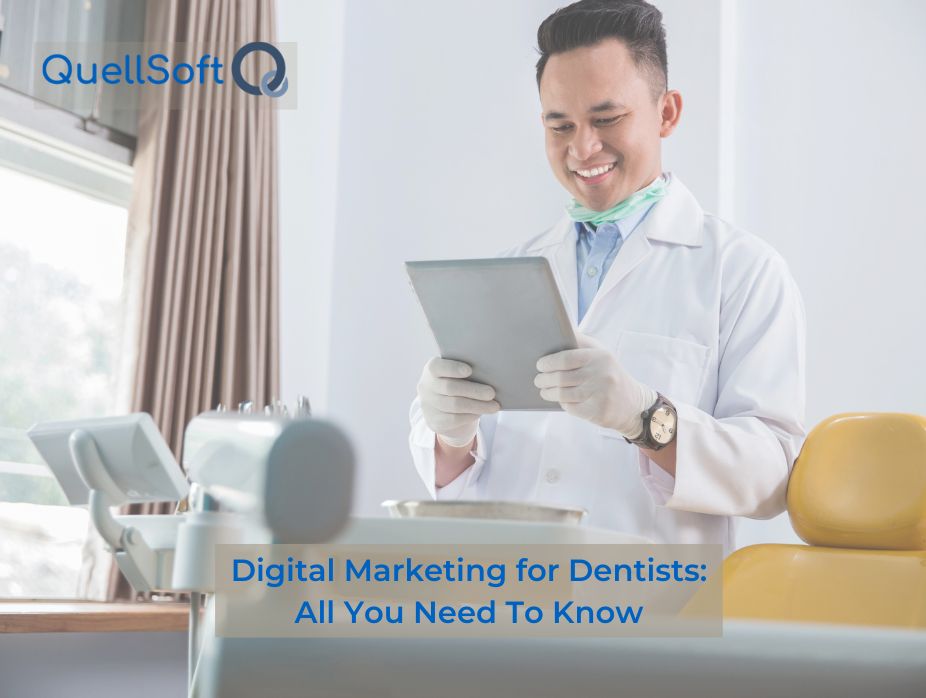
Digital Marketing for Dentists: All You Need To Know
The landscape of dental marketing has evolved significantly over the years. Traditional methods like print advertisements and word-of-mouth referrals are now complemented and often superseded, by Digital Marketing for Dentists. This shift is largely driven by the increasing number of patients turning to the internet to find and choose their dentist. This blog post aims to guide dentists through the intricacies of Online Digital Marketing for Dentists, helping them understand its pivotal role in modern dentistry. We will delve into various aspects of digital marketing for dentists, from creating a robust online presence to leveraging social media, managing online reputation, and understanding analytics.
The Digital Marketing for Dental Clinics Ecosystem
Overview of Digital Marketing for Dentists Channels
1. Search Engines
Search engines like Google are often the first point of contact between a potential patient and a dental practice. A well-optimized website can rank higher in search engine results, increasing visibility and attracting more traffic. It’s crucial to understand search engine algorithms and stay updated with their frequent changes to ensure your website remains at the top of search results. This is where Dental SEO Services come into play.
2. Social Media Platforms
Social media platforms like Facebook, Instagram, and LinkedIn offer a way to connect directly with existing and potential patients. They provide a platform for sharing informative content, promoting digital marketing for dentists services, and engaging with patients on a more personal level. Each platform has its unique user demographics and should be used strategically to reach the target audience.
3. Email Campaigns
Email campaigns allow dentists to send personalized messages directly to patients’ inboxes. They can be used to share educational content, appointment reminders, promotional offers, and more. A well-planned email campaign can help improve patient retention and attract new patients.
4. Online Advertising
Online advertising, including pay-per-click (PPC) advertising, display ads, and social media ads, can help dentists reach a larger audience. These ads can be targeted based on various factors like location, age, interests, and more, ensuring they reach potential patients who are likely to be interested in your services. A Dental PPC Agency can help you set up and manage these campaigns effectively.
The Patient’s Online Decision-Making Process
1. Awareness Stage
In the awareness stage, potential patients realize they have a dental issue and start looking for information online. They may search for symptoms, possible causes, and treatments. Digital marketing for dentists can attract these patients by providing informative content that answers their queries.
2. Consideration Stage
Once patients have gathered information about their dental issues, they move to the consideration stage where they evaluate different dentists and treatments. Digital marketing for dentists can stand out in this stage by showcasing their expertise, experience, and unique selling points.
3. Decision Stage
In the decision stage, patients choose a dentist and book an appointment. Digital marketing for dentists can make this process easier by providing online booking options, transparent pricing, and positive patient testimonials.
Creating a Robust Online Presence for Digital Marketing For Dentists
Website Development and Design
1. User Experience (UX)
User Experience (UX) is a crucial aspect of website design. It involves creating a website that is easy to navigate, intuitive, and user-friendly. A good UX design can significantly enhance a patient’s interaction with your website, leading to higher engagement and conversion rates.
2. User Interface (UI)
The User Interface (UI) is the visual layout of your website. It includes the color scheme, typography, images, buttons, and other visual elements. A well-designed UI can make your website aesthetically pleasing and professional, creating a positive first impression on potential patients.
3. Mobile Responsiveness
With the increasing use of smartphones for internet browsing, it’s essential for your website to be mobile-responsive. This means that your website should automatically adjust its layout and content to fit different screen sizes, ensuring a seamless browsing experience for all users.
Search Engine Optimization (SEO)
1. Keyword Research
Keyword research involves identifying the words and phrases that potential patients use when searching for digital marketing for dentists services online. These keywords should be incorporated into your website content to improve its visibility on search engine results.
2. On-Page SEO
On-page SEO refers to the optimization of individual web pages to rank higher in search engine results. This includes optimizing the title tags, meta descriptions, headers, and content of your web pages.
3. Off-Page SEO
Off-page SEO involves activities that are performed outside your website to improve its search engine rankings. This includes building high-quality backlinks, social media marketing, and online reputation management.
4. Local SEO
Local SEO focuses on optimizing your website to attract patients from your local area. This includes optimizing your Google My Business listing, collecting online reviews, and using local keywords in your content.
Content Creation
1. Blogging
Blogging is a powerful tool for attracting potential patients to your website. Regularly publishing informative and engaging blog posts can establish you as an authority in your field, build trust with potential patients, and improve your search engine rankings.
2. Infographics
Infographics are visual representations of information, making complex data easy to understand at a glance. They can be used to explain dental procedures, share oral health tips, or present statistics in a visually appealing way.
3. Video Content
Video content is increasingly popular and can be a great way to engage with potential patients. Videos can be used to demonstrate procedures, share patient testimonials, or provide educational content about oral health.
Social Media Marketing
1. Platform Selection
Choosing the right social media platforms is crucial for reaching your target audience. Facebook, Instagram, and LinkedIn are popular choices for dental practices, but the best platforms for you will depend on your specific patient demographics.
2. Content Strategy
Your social media content should be engaging, informative, and relevant to your audience. This could include posts about dental health tips, behind-the-scenes looks at your practice, patient testimonials, and promotional offers.
3. Engagement
Engaging with your audience on social media can help build relationships and foster a sense of community. This can involve responding to comments, asking questions, and encouraging user-generated content.
Online Advertising
1. Pay-Per-Click (PPC) Advertising
PPC advertising involves paying a fee each time one of your ads is clicked. Platforms like Google Ads and Facebook Ads offer PPC advertising options that can help drive traffic to your website.
2. Display Advertising
Display advertising involves placing banner ads on relevant websites. These ads can help increase brand awareness and attract potential patients to your website.
3. Retargeting
Retargeting involves showing ads to people who have previously visited your website. This can be an effective way to re-engage potential patients who have shown interest in your digital marketing for dentists services.
Email Marketing
1. Newsletter
Sending regular newsletters to your patients can help keep your practice top-of-mind. Your newsletter could include updates about your practice, dental health tips, and special offers.
2. Appointment
Reminders Email can be an effective tool for sending appointment reminders to your patients. This can help reduce no-shows and ensure your patients receive the care they need.
3. Promotional Emails
Promotional emails can be used to inform your patients about special offers, new services, or upcoming events at your practice.
Conclusion
Creating a robust online presence is crucial for attracting and retaining patients in today’s digital age, and QuellSoft can help you with that. By leveraging website development, SEO, content creation, social media marketing, online advertising, and email marketing, dental practices can effectively reach their target audience, build strong patient relationships, and grow their business. Digital marketing for dentists is not just a trend, but a necessity in the modern world. Whether it’s through Dental SEO Services, Dental PPC Agency, Dental Website Marketing, or Web Marketing for Dentists, the digital realm offers numerous opportunities for growth and success.



